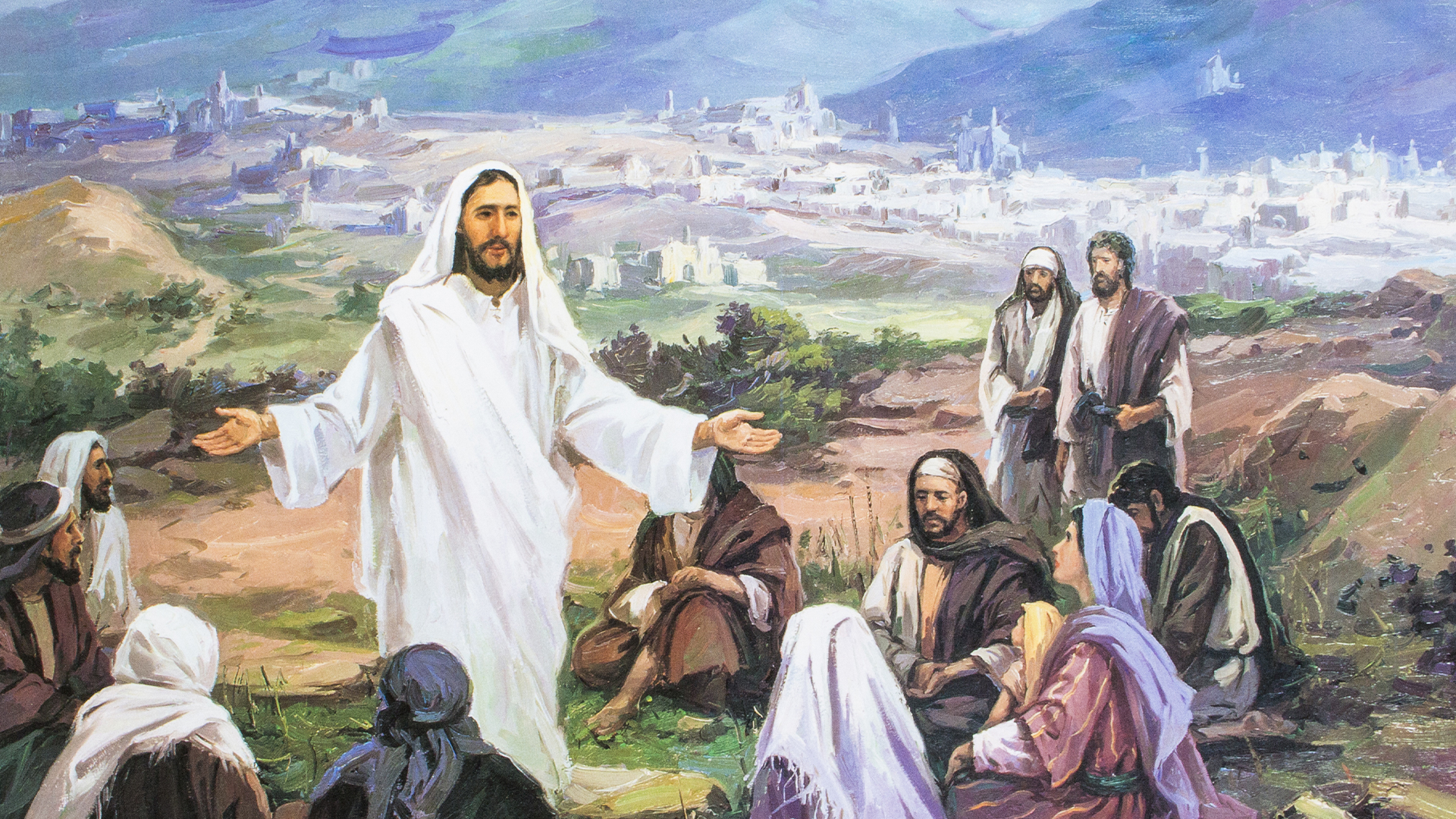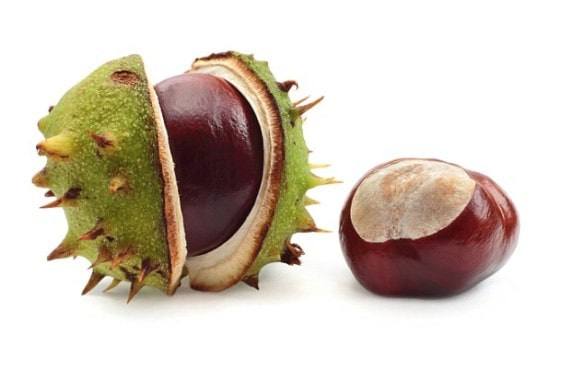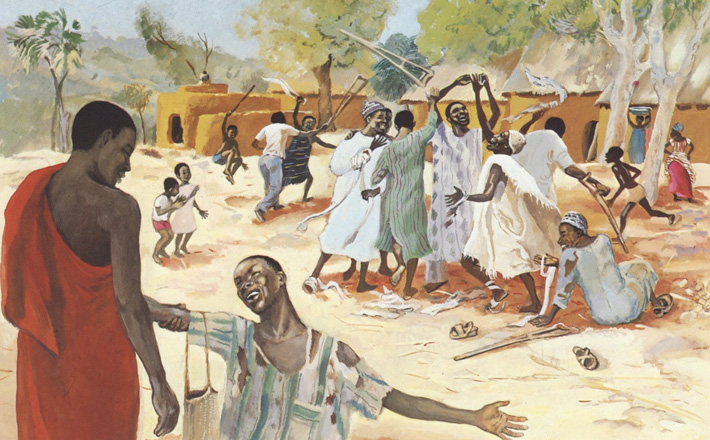|
I am going to take each reading separately, so first, the Genesis. The book of Genesis, whilst written by Moses, has its origins in four different ancient sources. The weirdness of this passage may be because it contains parts of these various sources, especially if they came from different cultures.
It is hard to explain Jacob fighting with God, even if it is God incarnate - that is God made flesh. The context of this reading involves Esau. As we recall, Jacob tricked Esau out of his birthright. So, this meeting is between Jacob and a man who vowed to kill him. Jacob’s anxiety may be exacerbated by the fact that Esau is meeting him with 400 men. So the context of this strange dream or encounter is on the day before this historic meeting is to take place. I think this resonates with all of us because we have all had that feeling of foreboding. Indeed, I read that two-thirds of adults in England say they regularly experience “Sunday Scaries”, which is anxiety about the coming week. So Jacob could have been having a restless, sleepless night. Is Jacob wrestling Esau in his dream, an angel or God incarnate? We do not know, but it is the wrestling that fascinates us. I am old enough to remember World of Sport at 4 pm on a Saturday when Kent Walton would say, “Welcome grappling fans”. Wrestling and grappling involve flesh touching flesh. It is an all-embracing struggle as one person tries to outpower, outthink and outmanoeuvre the opponent. I like the idea of Jacob wrestling with God because, as a Christian, it permits me to wrestle with God myself. Not physically but mentally, calling God to account and trying to understand God’s ways. Even Jesus wrestled on the night before his crucifixion. So I think it is okay to wrestle with God in our minds. Encountering God will change you. In acknowledgement of that, in this story and throughout the bible, names are changed following encounters. Jacob became Israel, which can mean God saves or one who struggles with God. Abram became Abraham and Saul became Paul. Simon became Peter the Rock. So, names are important as they reflect the new personality formed by an encounter with a living God. The story has a happy ending. Rather than killing Jacob, Esau forgives, just as later Jacob’s son Joseph would forgive his eleven brothers. So I take away from this reading permission to wrestle with God whilst acknowledging God’s sovereignty over me. Encounters with God create a change in you, and it is okay to face our fears, trust in God and be obedient to God. It is a story of forgiveness and moving on. From the Luke text, there is much for us to take. The persistent widow talks to us about justice, faith and persistence in prayer. We know that the judge had no regard for God or others, although we do not know if he were corrupt, as some commentaries state. It might be that all judges are corrupt, but the passage only tells us that he was ungodly. According to Deuteronomy 16:18, the role of the judge was to render just decisions, and Exodus 22:22 reminds us that we should not mistreat any widow. Yet, the widow, a woman without a husband, probably childless, was the most marginalised person in society other than children. Yet she has a voice. Despite having no power, no influence and no people supporting her, she uses her voice effectively because of her persistence. There are many examples of persistence in today’s society. Walt Disney, for example, was told a mouse would never work. Oprah Winfrey was told she was unfit for television. Stephen Spielberg was rejected three times from film school. Elvis Presley was fired after one performance and told “you ain’t going nowhere son, you ought to go back to driving a truck. Sidney Poitier was told he could not act and that he would make a better dishwasher. Colonel Sanders of KFC fame has his “Finger Lickin’ Recipe” rejected 1,009 times. J. K. Rowling had her Harry Potter books rejected by 12 different publishing houses. So, persistence pays off. The story speaks of faith. The woman did not know that she was going to have her request granted, but she had hope and faith that somehow she would be heard and her cause righted. From this, we can take that ability to keep going in faith, so long as we are also enveloped by prayer. Some people say that prayer is a waste of time, yet through prayer, we can harness the energy, articulate our thoughts, and hopefully see the world through the eyes of God. Alfred Lord Tennyson (1809-82), in his book Idylls of the King, said, "Pray for my soul, more things are wrought in by prayer than this world dreams of; wherefore let thy voice rise like a fountain for me night and day." Prayer indeed works. Sometimes this is in ways we were not expecting. Sometimes it is not in the time frame we want but in God's time frame. Sometimes the prayer we ask is not right for us and is consequently sidelined, but the power of prayer gives us the energy to try harder. If we keep on praying, we keep the hope alive. The interesting thing about this reading is it shows the unusual happening. The widow wins. Sometimes, when we keep on going, we do get the break that we need. I wonder if the Kingdom of Heaven is a kingdom where the unusual happens. Regarding prayer, I recall Ralph Waldo Emerson (1803-82) in his book Self Reliance and other essays saying, "Prayer is the contemplation of the facts of life from the highest point of view." So with prayer, we are trying to see things from the compassionate and merciful eyes of an ever-creative, ever-loving God. Prayer through God's eyes helps us see the bigger picture. In this parable, we see ourselves as perhaps the widow fighting our just causes. But are we ever the judge? Do we have people who continually annoy us, and to get rid of them, we give in? Remembering that we are sometimes the judge, not the widow, may create humility in us. The main take from this text is how great God is, that if the judge can be moved, how much more God will listen to us. It reminds us of God's ability to listen but also the persistence of prayer. Paul writes in his first letter to the Thessalonians 5:17 that we are to pray without ceasing. Thomas Edison wrote, "Our greatest weakness lies in giving up. The most certain way to succeed is always to try one more time." And who can forget Winston Churchill's famous speech, where he stood up to the people longing to hear Churchill at his greatest oration, saying simply, "Never, never, never give up." Finally, I leave you with the acronym, PUSH, which stands for Pray Until Something Happens. Also remember, it is always the squeaky gate or wheel that gets oiled first.
1 Comment
The shell is there to keep the conker safe and put off predators. So, let us reflect upon what keeps us safe. Do we find our security in Jesus or in other places? The shell also represents a mask. Sometimes we wear masks to navigate through life. Some bullies at school choose bullying as a mask for their own insecurities. Let us remember that Jesus sees through our masks and sees the true beauty that we possess. The conker represents true beauty. It can be polished, making its lovely brown shine. It is totally aesthetically pleasing. Let us meditate on the beauty of the conker and just enjoy it. Enjoy the feel of it, the touch. Let us remember that it is a seed, so the conker also represents potential. Let us think about our own potential. For this conker to grow into a tree and produce other conkers, it needs the right soil, rain, and sun. We know how to make this conker grow into a tree, but what do we need for our potential to grow? What is our soil like? Our environment? Our values? Our friends and family? Do they encourage and support us? Are they there for us in times of difficulty? Do we have role models? Do we know what we want to achieve? Whatever our potential, look upon this conker as a representation of what we can offer. This conker is so much more than a seed. We are also much more than what people see first of all. Conkers contain aesculin, which Doctor Google, the source of my information, advises is a blood thinner and counters water retention. This conker contains anti-oxidants, which prevent cell damage and contains. It is twenty times stronger than vitamin C in the fight against free radicals. Wrinkles are diminished after a minimum of 4 weeks of use. Horse chestnuts strengthen hair roots and accelerate hair growth. Apparently, it is also a treatment for varicose veins and haemorrhoids. Also, the horse chestnut was so named because its seeds were once used to treat ailments in horses. So within this one conker, through the brilliance of science, there is the opportunity for healing. I understand that the saponins in conkers are soap-like chemicals that are sometimes added to shampoos and shower gels. If you put a conker in your wardrobe, the triterpenoid saponin wards off moths. Fresh conkers, as they dry, emit the moth repellent. In Victorian times, the shells were ground and used to make flour. This is not recommended because conkers are poisonous. As we continue our meditation, think about how we can heal others. What inner strengths do we have? Have we been poisonous to other people? Should we be seeking forgiveness because we have hurt someone, even unintentionally? For the final part of our meditation, put a cross on the conker. The cross of Jesus reminds us that Jesus has CONKERED death. Let us use this conker to think about how we conquer evils. Reflect upon Romans 12:21, “don’t let evil conquer you, but conquer evil by doing good.” Remember the words of Jeremiah 15:20, “they will not conquer you for I am with you to protect and rescue you.” Psalm 91:10 says, “no evil will conquer you”. This conker represents eternal life. Jesus has conquered death through his resurrection, and as Christians, we can be reassured that, though we may die physically, our life continues in spiritually heaven. This humble conker, which in autumn you can see on the ground in plentiful supply, offers so much just as we offer so much. Everywhere we go, we can spread the gospel of the good news that Jesus has conquered death. We demonstrate this in our way of living: our positive attitude and ability to heal others by being there for them, walking alongside them and praying with them. Amen. This sermon was first preached by Reverend Martin Wheadon at Wanstead United Reformed Church on 9th October 2022
Reading: Luke 17:11-19 Leprosy is the common word used when talking about this reading, but I believe that in the original Greek, “skin disease” is actually mentioned. Leprosy has now changed its name to Hanson’s Disease to avoid some of the stigmas. In the days of Jesus, if you had a skin disease, it was considered contagious, so you were either hounded out of the village or you went voluntarily amongst a community of other skin disease sufferers. Unable to work, sufferers had to beg, and commentaries tell us that if they did enter the village, they had to give a warning that they were coming so that people could get out of their way. It is to this community that Jesus performs a miracle. The ten men with a skin disease called to Jesus in a loud voice, “Jesus, Master, have pity on us.” Jesus’ reputation was obvious as he was mentioned by name. When they shouted to him at a distance, Jesus had compassion and healed them. Leviticus 14 covers a situation where somebody was ill with a skin disease and was cured. They had to get a certificate from a priest to confirm that the cure was genuine. So Jesus complied with the Jewish law, telling them to ask a priest to confirm they were cured. Then the ten go in faith, believing that they were healed, but it was only one who came back, praising God and then thanking Jesus. The order is quite important. We praise God for God’s greatness and then say thank you. We must acknowledge God’s part in the process of healing. To illustrate this point, the one person who came back is a Samaritan, a race of people hated by the Jews. The life lessons, or what I call the GHIJ lessons, in this passage are as follows. G is for gratitude. We must always have a life of praise and an attitude of gratitude. For this dispels negativity and focuses on the positive. Once we start looking for things for which we a grateful, we find more and more. The more things we find, the more it increases our praise. The more we praise, the more we are thankful. The more we are thankful, the more we praise. This virtuous cycle condemns the negative and isolates it so that you can concentrate on the positives of life and in so doing become healthier and feel the benefits. H is for healing, not just the power of Christ to heal, but also the wonder of our body, which can heal itself. Whilst cuts and bruises may leave a scar, over time, they are healed. In this busy world, spiritual healing can take place if you find spaces of peace, a place where you can still your mind, rest and relax. It is the healing power of Christ and the healing power of our bodies made by God on which we have to focus. Find a place where you can be at rest, still and calm. I is for inclusivity. In this story, Jesus focused on the Samaritan. The Jews hated Samaritans to get the plaudits, but Jesus’ love is unconditional. We have no idea if the ten men with skin disease deserved to be made better. Jesus does not weigh up if you deserve to be better, Jesus just makes people better without judgement. In a society that tends to make tribes and highlight tensions between groups of people, we must see people as Jesus sees. That is as precious children of God. J, of course, is for Jesus. Our life lesson here is to try and model Jesus: radical, fearless, loving and compassionate. From this simple story, take away the life lessons of having an attitude of gratitude and of finding places of healing, both physical, mental and spiritual. Always be inclusive. Listen to voices you would not usually listen to, and do not prejudge. Focus on Jesus and his lifestyle, his values and beliefs. This sermon was first preached by Reverend Martin Wheadon at Wanstead United Reformed Church on 9th October 2022
|
©Copyright
We are happy for you to use any material found here, however, please acknowledge the source: www.gantshillurc.co.uk AuthorRev'd Martin Wheadon Archives
June 2024
Categories
All
|



 RSS Feed
RSS Feed